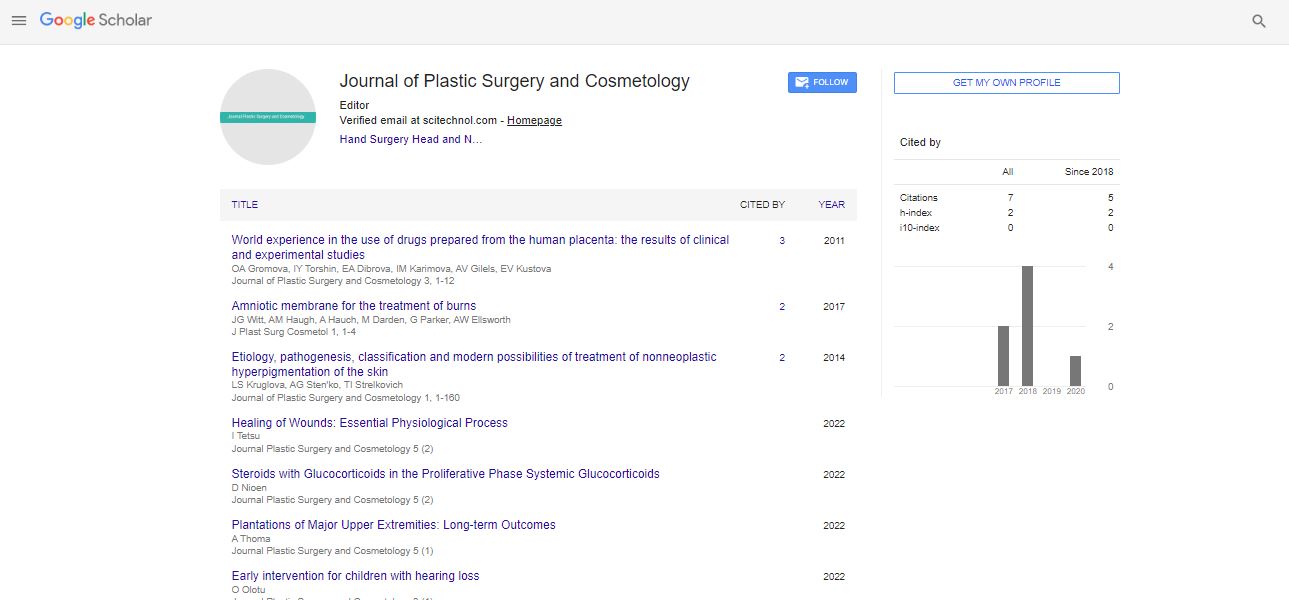Perspective, J Pls Sur Cos Vol: 12 Issue: 2
Cosmetic Facial Surgery Techniques in Improving Facial Aesthetics
Wei-Ning Hukie*
Department of Surgery, Hartford Hospital, Connecticut, USA
*Corresponding Author: Wei-Ning Hukie,
Department of Surgery, Hartford Hospital, Connecticut, USA;
E-mail: Hukiening323@gmail.com
Received date: 29 May, 2023, Manuscript No. JPSC-23-106782;
Editor assigned date: 31 May, 2023, PreQC No. JPSC-23-106782(PQ);
Reviewed date: 14 June, 2023, QCNo JPSC-23-106782;
Revised date: 21 June, 2023, Manuscript No. JPSC-23-106782(R);
Published date: 30 June, 2023, DOI: 10.4172/JPSC.100051
Citation: Hukie W (2023) Cosmetic Facial Surgery Techniques in Improving Facial Aesthetics. J Pls Sur Cos 12:2.
Description
Cosmetic facial surgery encompasses a wide range of surgical procedures aimed at enhancing facial aesthetics and improving selfconfidence. This study provides an overview of the techniques and outcomes of commonly performed cosmetic facial surgeries. It discuss facial rejuvenation procedures, such as facelifts, blepharoplasty, and brow lifts, as well as rhinoplasty, otoplasty, and chin augmentation. The study explores the surgical techniques involved in each procedure, along with the associated risks and benefits. Furthermore, it is examine the impact of cosmetic facial surgery on patients' psychological well-being and quality of life. An understanding of these procedures and their outcomes is essential for both patients and practitioners to make informed decisions regarding cosmetic facial surgery.
Cosmetic facial surgery has gained popularity as a means of improving facial aesthetics and addressing concerns related to aging and facial harmony.
This study is about interventions to enhance specific facial features. Additionally, it explores the psychological impact of these procedures and their effects on patients' quality of life.
Techniques
Facial rejuvenation procedures, including facelifts, blepharoplasty, and brow lifts, aim to reverse the signs of aging and restore a youthful appearance. These surgeries involve techniques such as tissue repositioning, fat grafting, and skin resurfacing. Rhinoplasty, otoplasty, and chin augmentation focus on enhancing specific facial features. Each procedure requires meticulous surgical planning and execution to achieve the desired aesthetic outcomes while maintaining facial harmony. Complications associated with cosmetic facial surgery are generally rare, but patients should be informed about potential risks, including bleeding, infection, scarring, and asymmetry. Despite these risks, studies have consistently shown high patient satisfaction rates following cosmetic facial surgery.
Complications
Cosmetic facial surgery not only improves physical appearance but also has a significant impact on psychological well-being and quality of life. Patients often report increased self-confidence, improved body image, and enhanced social interactions following successful procedures. However, careful patient selection and counseling are essential to ensure realistic expectations and to address psychological factors that may influence surgical outcomes. Additionally, the role of non-surgical facial rejuvenation techniques, such as injectables and laser treatments, should be considered as alternative or adjunctive options.
Cosmetic facial surgery is a specialized field that focuses on enhancing the aesthetics of the face. It encompasses a variety of surgical procedures aimed at improving facial features and achieving a more youthful appearance. Common cosmetic facial surgeries include facelifts, rhinoplasty (nose surgery), blepharoplasty (eyelid surgery), and chin augmentation, among others. These procedures are performed to address concerns such as sagging skin, wrinkles, nasal deformities, and imbalances in facial proportions. Cosmetic facial surgery requires meticulous surgical techniques and a comprehensive understanding of facial anatomy to achieve natural-looking results. The ultimate goal is to enhance patients' self-confidence and overall facial harmony, creating a positive impact on their well-being.
Conclusion
Cosmetic facial surgery offers effective solutions for individuals seeking to enhance their facial aesthetics and address concerns related to aging or specific facial features. The success of these procedures relies on a thorough understanding of the surgical techniques, careful patient selection, and comprehensive preoperative counseling. Furthermore, recognizing the psychological impact of cosmetic facial surgery and its influence on patients' quality of life is an important for optimizing outcomes and ensuring patient satisfaction.
 Spanish
Spanish  Chinese
Chinese  Russian
Russian  German
German  French
French  Japanese
Japanese  Portuguese
Portuguese  Hindi
Hindi 